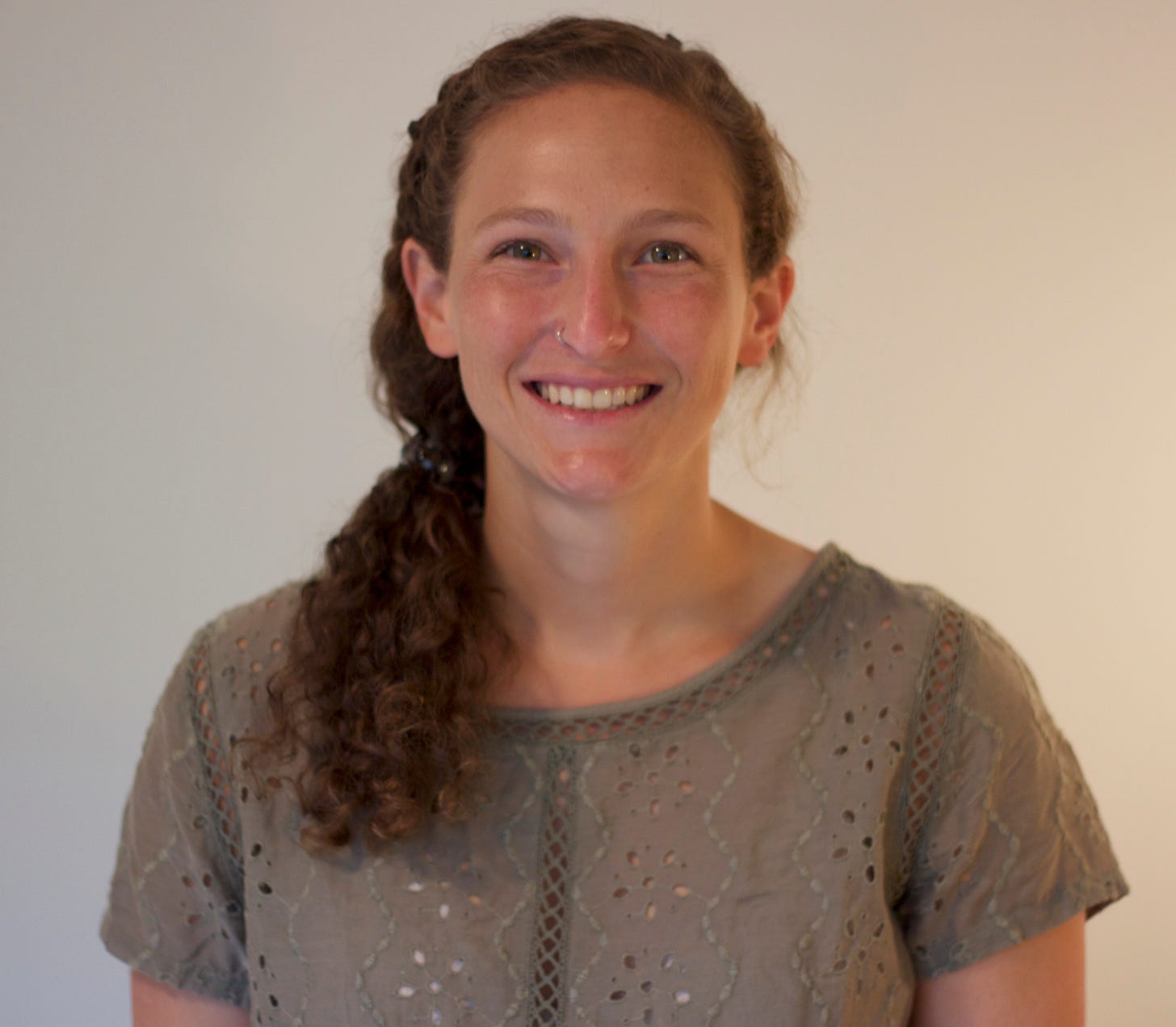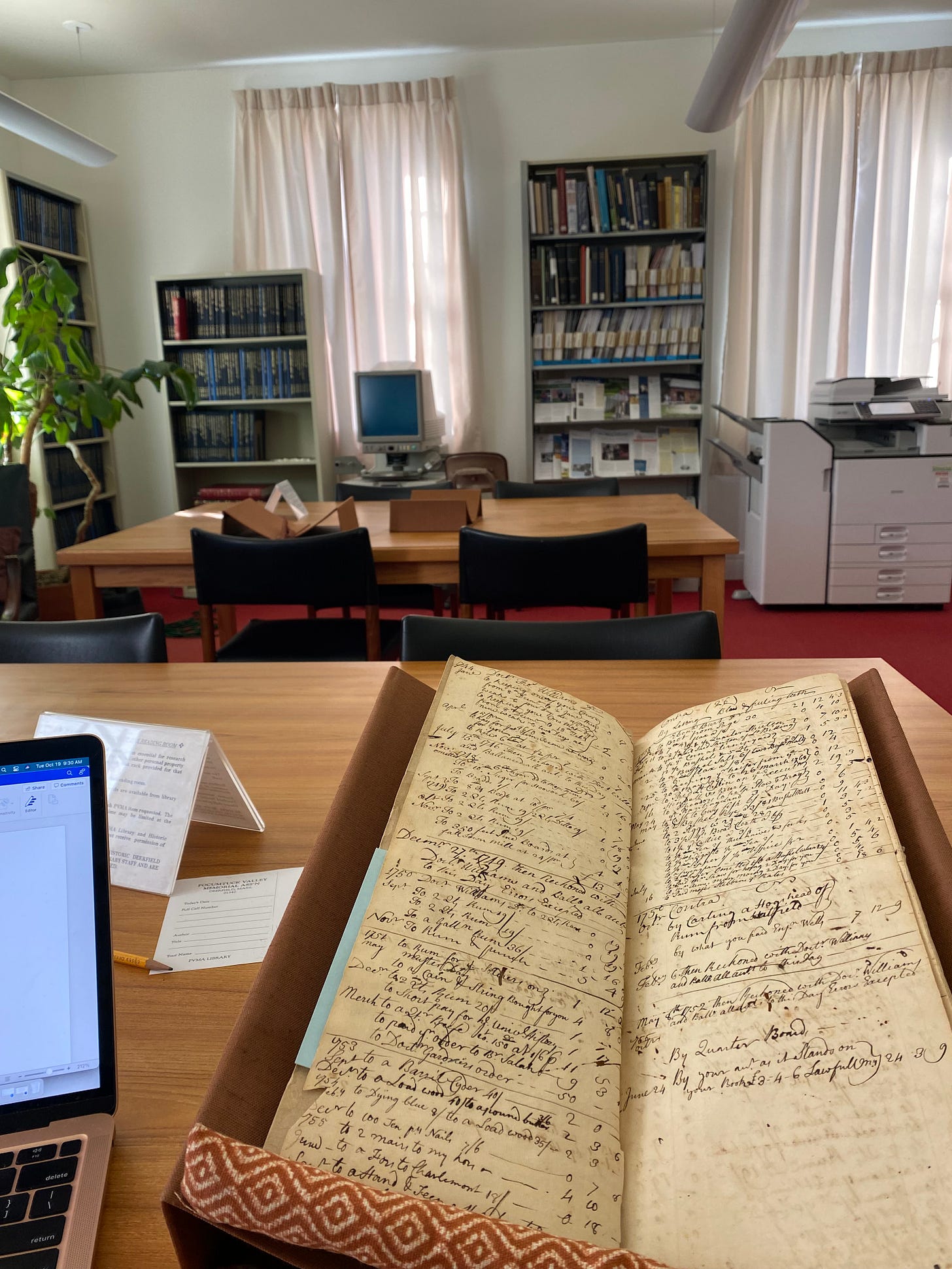Caylin Carbonell was sitting at the table next to me one day, in the library of the Pocumtuck Valley Memorial Association in Deerfield, MA. I have decided that I’m going to make it a practice to talk with people in these research libraries, which is usually not done, so I asked what she was working on and was delighted when she was actually willing to have a chat. I was researching Charlotte Alice Baker, one of the founders of the PVMA, a queer white “history lady” from the late 19th century who studied the early settler years of Deerfield; Caylin was reading account books from those early settlers themselves, and told me that she studies domestic labor, gender, and race.
I am so glad I got the chance to ask her more about her work and share it with you, in this compassionate, enthusiastic interview. We talked about her research methods (I always love to talk methods with historians!), how she follows her gut, and that she was originally told that she was never going to find traces of the women workers that she wanted to learn about. But she did, of course. So you’ll learn about the levels of “unfree” work in the pre-Revolution North, from enslavement to indenture to the subservience of the woman of the house. We explored the dynamics of close relations in a household, and how people found ways to make home and community for themselves. We talked about how historic sites can enhance their interpretation of stories that are difficult for some white visitors - and see it not as potential risk (making someone uncomfortable) but as an availabile opportunity (telling a richer, fuller story). The world expanded when Caylin became a historian, because she could hear more voices. And, it turns out, the world of the past was filled with voices too; our historic sites (and our libraries!) are only silent because expectations for reverence at these sites have made them so. I can’t wait to hear what you think.
At the end of the interview, I asked Caylin if she would be up for answering questions from you all about the history of New England, or Virginia, between the time of colonization and the Revolution. She is willing, so please send them in and I will find a way for her to answer.
I can’t emphasize enough how I believe this kind of work is linked to the ongoing crisis of the American project today. The colonial world laid the ground work for our current society, with its campaigns of extermination and enslavement. And the colonial world we think we know is in some ways a historical fiction invented in the era of the history ladies to justify their own era of subjugation, empire, and eugenics, and also to satisfy their very real grief and dislocation. We can’t leave any of the links in this chain out, and we can’t forget how none of us is free when anyone is unfree.
solidarity space
I am mourning the deaths of Margus D. Morrison, Andre Mackniel, Aaron Salter, Geraldine Talley, Celestine Chaney, Heyward Patterson, Katherine Massey, Pearl Young, and Ruth Whitfield. I share this list of Black-led organizations in Buffalo who are working to end food apartheid and violence, compiled by the Northeast Farmers of Color Land Trust, if you are intending to move any funds towards that community right now.
further study
Here are some references for you to follow, from Caylin and me
Historians are not taught to mourn, heal, and hold grief. This is something I am learning, because it is something I want to do for us. It’s something I’m talking with historians about too, whenever they’ll let me! Because I’m coming to understand memory work truly as a front-lines practice. This piece from The Experiment about the struggle to keep alive the memory of brutal Civil Rights Era murders really knocked my socks off.
the Nehemiah Bull desk/table at Historic Deerfield
Kathleen M. Brown, Good Wives, Nasty Wenches, and Anxious Patriarchs: Gender, Race, and Power in Colonial Virginia (Published by the Omohundro Institute of Early American History & Culture and the University of North Carolina Press, 1996)
Wendy Warren, New England Bound: Slavery and Colonization in Early America (New York: Liveright Publishing, 2016),
Jared Hardesty, Unfreedom: Slavery and Dependence in Eighteenth-Century Boston (New York: NYU Press, 2016),
Margaret Newell, Brethren by Nature: New England Indians, Colonists, and the Origins of American Slavery (Ithaca: Cornell University Press, 2015)
Food, memory, ancestors and enslavement are at the heart of Michael Twitty’s The Cooking Gene, and if you haven’t read it, please please do.
Cheyney McKnight is bringing this history alive too, with her project Not Your Momma’s History








Share this post